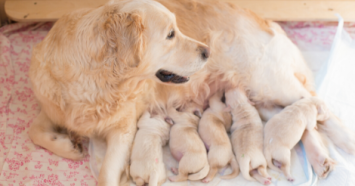
With no national standard for dog breeding practices, it is up to the puppy buyer to do his homework before getting a dog. Ethical Dog Breeders make it their life’s passion to learn about the history of their breed, canine health, genetics and structure. They are interested in forming relationships with their puppy buyers and want to have continued contact throughout the dogs’ lives to ensure they are valued members of the family.
An Ethical Dog Breeder:
Is a member in good standing with the official parent club for the breed
Follows the parent club’s Code of Ethics
Provides complete, accurate health records for the puppies
Provides results from genetic medical testing of the parents
Offers a written guarantee against genetic health problems
Provides buyers with a four generation pedigree
Retains puppies until they are a minimum of nine weeks of age
Encourages potential buyers to visit their home prior to the pickup day
Ensures their puppies are exposed to other animals, new people, children and noises
Provides puppies with a specific elimination area away from the sleeping area
Encourages buyers to participate in puppy socialization and/or basic obedience classes
Will take the puppy back from the buyer at any time for any reason
Questions to ask the breeder:
Have they begun house training the puppies? If yes, how?
Do the puppies know any basic obedience skills? It is never too early to start training a dog.
Have they begun separating puppies from the rest of the litter for short periods of time and placing them in crates?
Dogs are social! Going from being part of a litter to alone in the crate in a strange place can be very traumatic. The breeder should have started this process.
If this is a breed that requires routine grooming, has the breeder begun handling the puppies? Have they bathed the puppies, or clipped them?
Do either of the parents guard food, toys, bones?
Is there any history of behavior problems in the pedigree i.e. separation anxiety, dog aggression, confinement stress?
How many people outside of the breeder’s immediate family have the puppies met?
Have the puppies been around any other dogs aside from their mother?
Have the puppies been exposed to other breeds aside from their own?
Have the puppies been exposed to loud and unexpected noises? This would include slamming doors, men yelling, vacuum cleaner etc.
Things to notice about the environment:
Is there a single crate or exercise pen with newspaper spread out all over the floor, or do the puppies have a specific area to eliminate? Is there urine and feces in the elimination area or all over the floor?
Look to see if there is one food bowl or multiple food bowls. As the puppies become older, they are likely to develop competitive behavior. There should be one bowl for each puppy.
Are the puppies playing with one another or do they seem to be “arguing” over toys?
Are they respectful of you and your personal space or do they jump all over you and constantly play bite your hands?
Do they self-entertain with toys or are they always running around looking for something to do?
What happens if you stop one of the puppies from playing and try to restrain him?
Choose another breeder if:
You are unable to meet the mother and/or the father
The parents growl, snap or show extreme signs of being afraid of you
The breeder cannot provide results for the genetic medical testing
The majority of the litter does not appear social and confident
The puppies have not been exposed to any other people outside of the breeder’s home
The puppies have not been outside of the breeder’s home since birth
Your gut says something isn’t right
An Ethical Dog Breeder will do 60% of the work for you in terms of providing you with a healthy, well-socialized puppy that has all of the necessary components for being a great family companion. Buying your new puppy from an Ethical Dog Breeder that strives to produce dogs with great temperament and raises their puppies in a manner that promotes confident, social behavior is a must.